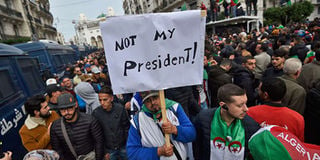Algeria poll fails to stop protests

An Algerian protester lifts a placard in the capital Algiers on December 13, 2019, as he takes part in a demonstration to reject the results of the presidential elections. PHOTO | RYAD KRAMDI | AFP
What you need to know:
- After ruling Sudan with an iron fist for three decades, Bashir was overthrown by the army on April 11 after months of demonstrations triggered by an economic crisis.
- Demonstrators feeling trapped in the quagmire of the post-Bouteflika era vowed to keep protesting until real change is assured.
All along, there was little hope that the outcome of the Algerian presidential poll on Thursday would usher in stability in the troubled country.
Therefore, few were surprised when massive anti-establishment protests resumed soon after former PM Abdelmadjid Tebboune was declared president on Friday.
The poll had an estimated turnout of 40 per cent, but state media still declared it high enough to justify it in spite of protesters' call for a boycott.
The argument was that the results would hopefully enable the new president to implement his reforms, but the demonstrators who early in the year forced out Abdelaziz Bouteflika, 82, were implacable.
They adamantly held onto the perception that Tebboune's victory showed that the country is stuck in the status quo rut.
REAL CHANGE
The latest events in Algeria unfolded just as former Sudan despot Omar al-Bashir prepared to face his high noon at a Khartoum court on Saturday.
After ruling Sudan with an iron fist for three decades, Bashir was overthrown by the army on April 11 after months of demonstrations triggered by an economic crisis.
Months after Bashir’s ouster, he was found guilty of illegally acquiring and using foreign funds and sentenced to two years in jail.
Bashir is also wanted by the International Criminal Court for his role in the Darfur war. The court accuses Bashir of genocide, war crimes and crimes against humanity.
In Algeria, demonstrators feeling trapped in the quagmire of the post-Bouteflika era vowed to keep protesting until real change is assured.
Citing the links of the five presidential candidates to Bouteflika and the ruling elite, the huge crowds gathered in Algiers to protest against the election they denounced as a sham.
CANDIDATES
According to preliminary results, Abdelmadjid Tebboune – a former housing minister under Bouteflika – was well ahead of his four competitors after garnering 58 per cent of the ballots cast.
Abdelkader Bengrina came second with 17.38 per cent, ahead of former prime minister Ali Benflis, who was third with 10.55 per cent.
Behind him was former minister of culture Azzedine Mihoubi, who took fourth place with 7.26 per cent, followed by Abdelaziz Belaid, the head of el Moustakbal party, who won 6.66 per cent.
The results aside, it seems clear that a disputed election was hardly the panacea the vast north African country needs right now.





